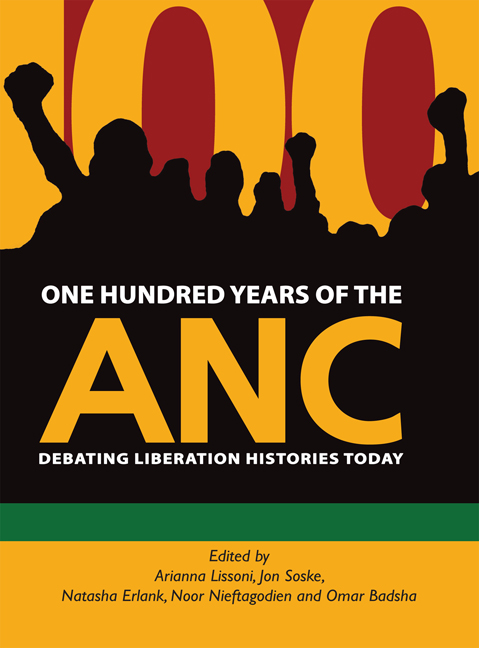Book contents
- Frontmatter
- Contents
- Acknowledgements
- Editorial Note
- FIRST KEYNOTE ADDRESS: Fragmentation and Cohesion in the ANC: The First 70 Years
- SECOND KEYNOTE ADDRESS: A Continuing Search for Identity: Carrying the Burden of History
- Chapter One One Hundred Years of the ANC: Debating Struggle History After Apartheid
- Chapter Two Religion And Resistance In Natal, 1900–1910
- Chapter Three Christianity and African Nationalism in South Africa in the First Half of the Twentieth Century
- Chapter Four Charlotte Maxeke: A Celebrated and Neglected Figure in History
- Chapter Five Imagining the Patriotic Worker: The Idea of ‘Decent Work’ in the ANC's Political Discourse
- Chapter Six Popular Movements, Contentious Spaces and the ANC, 1943–1956
- Chapter Seven Unravelling the 1947 ‘Doctors’ Pact’: Race, Metonymy and the Evasions of Nationalist History
- Chapter Eight The Politics of Language and Chief Albert Luthuli's funeral, 30 July 1967
- Chapter Nine Robben Island University Revisited
- Chapter Ten Shishita: A Crisis in the ANC in Exile in Zambia, 1980–811
- Chapter Eleven Comrade Mzwai
- Chapter Twelve Revisiting Sekhukhuneland: Trajectories of Former UDF Activists in Post-Apartheid South Africa
- Chapter Thirteen Regeneration of ANC Political Power, from the 1994 Electoral Victory to the 2012 Centenary
- Chapter Fourteen The ANC: Party Vanguard of the Black Middle Class?
- Chapter Fifteen Globalisation, Recolonisation and the Paradox of Liberation in Southern Africa
- Contributors
- Index
Chapter One - One Hundred Years of the ANC: Debating Struggle History After Apartheid
Published online by Cambridge University Press: 21 April 2018
- Frontmatter
- Contents
- Acknowledgements
- Editorial Note
- FIRST KEYNOTE ADDRESS: Fragmentation and Cohesion in the ANC: The First 70 Years
- SECOND KEYNOTE ADDRESS: A Continuing Search for Identity: Carrying the Burden of History
- Chapter One One Hundred Years of the ANC: Debating Struggle History After Apartheid
- Chapter Two Religion And Resistance In Natal, 1900–1910
- Chapter Three Christianity and African Nationalism in South Africa in the First Half of the Twentieth Century
- Chapter Four Charlotte Maxeke: A Celebrated and Neglected Figure in History
- Chapter Five Imagining the Patriotic Worker: The Idea of ‘Decent Work’ in the ANC's Political Discourse
- Chapter Six Popular Movements, Contentious Spaces and the ANC, 1943–1956
- Chapter Seven Unravelling the 1947 ‘Doctors’ Pact’: Race, Metonymy and the Evasions of Nationalist History
- Chapter Eight The Politics of Language and Chief Albert Luthuli's funeral, 30 July 1967
- Chapter Nine Robben Island University Revisited
- Chapter Ten Shishita: A Crisis in the ANC in Exile in Zambia, 1980–811
- Chapter Eleven Comrade Mzwai
- Chapter Twelve Revisiting Sekhukhuneland: Trajectories of Former UDF Activists in Post-Apartheid South Africa
- Chapter Thirteen Regeneration of ANC Political Power, from the 1994 Electoral Victory to the 2012 Centenary
- Chapter Fourteen The ANC: Party Vanguard of the Black Middle Class?
- Chapter Fifteen Globalisation, Recolonisation and the Paradox of Liberation in Southern Africa
- Contributors
- Index
Summary
On 8 January 2012, the African National Congress (ANC) inaugurated a yearlong series of programming, celebrating the foundation of the South African Native National Congress (SANNC) in 1912. The centenary of the ANC – the oldest African political organisation on the continent and indeed one of the oldest parties in the world – represents an historic milestone and cause for celebration in South Africa and beyond. Not only has the ANC survived for one hundred years, it has played a major role in creating a shared sense of unity and purpose that allowed it to develop into a force commanding the support of the majority of people in the country (as well as of one of the largest and most successful international solidarity movements of the twentieth century), which, in turn, brought it to power in 1994. Iconic leaders like Nelson Mandela, Oliver Tambo and Albertina and Walter Sisulu have been celebrated around the globe precisely because they came to embody interconnected struggles for racial equality, social justice and human emancipation. Whatever its shortcomings, the negotiated settlement that led to the 1994 democratic elections, and the subsequent Truth and Reconciliation Commission hearings, created a new model of transitional justice widely praised around the world. Born as the organisation of a tiny, dispersed, and relatively conservative black middle class, the ANC has shown itself to be protean and responsive to changing political and social climates in the intervening one hundred years. Today, the party governs the country with significant popular support and will likely retain power for the foreseeable future.
Yet, is the nationalist movement formed in 1912 the same party that now rules? Yes and no. Part of the ANC's success derives from its capacity to reinvent itself during the course of struggle by drawing on older images, symbols and rhetoric even while it evolves in new directions. The continuity with the founding conference at Bloemfontein is real precisely because the ANC has always sought to make it so: a profound sense of tradition remains central to the organisation's political culture. In other ways, however, the ANC's long history has also been marked by significant discontinuities and ruptures. Internal struggles polarised the party in the 1920s, throughout the 1950s, and leading up to and following the 1969 Morogoro Conference – to name only a few salient moments.
- Type
- Chapter
- Information
- One Hundred Years of the ANCDebating Liberation Histories Today, pp. 29 - 54Publisher: Wits University PressPrint publication year: 2012

